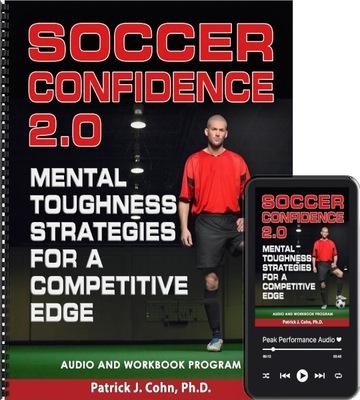
How do you React After Underperforming in the First Half?
After a lackluster first half, your response coming off the field or in the locker room sets the tone for the second half:
* If you criticize yourself, you will lose confidence.
* If you feel bad about yourself, your negative emotions will intensify.
* If you believe you can’t bounce back, you will mentally give up and concede a loss.
The key to improving your first-half performance is to use your halftime by resetting and preparing to compete for the second half.
The Resetting Process:
- Take some time for rest, rehydration, and mental release. This time is a physical and mental break to catch your breath, settle your emotions and clear your mind.
- Don’t overanalyze or overthink the first half. Take a brief assessment, define a second-half strategy, and come up with 1-2 points on how you can implement your game plan.
- Tell yourself that the second half is a chance to start anew. The first half does not dictate how you will play in the second half.
- Briefly visualize successfully implementing your game plan.
In most games, you will need to reset at some point, such as if you trail at halftime, are issued a yellow card, let in a goal, make a bad pass, miss a scoring opportunity, or foul an offensive player in the box.
Sometimes, you will have more time than others to reset, so it is essential to have a strategy that can be quickly implemented.
You can apply a shortened version of the halftime resetting strategy.
- Take a quick mental break. A few deep breaths will suffice to settle your emotions.
- Don’t overanalyze the mistake or bad call. Remind yourself of what you need to do or what you should focus on next.
- Refocus on the present moment. Remind yourself that reliving a mistake has zero benefits.
- Press the pause button on your mental images and use a cue phrase such as, “Move on. I got this.”
At the 2023 SheBelieves Cup, the USWNT beat Brazil 2-1 to win its sixth Cup. By their standards, the US squad underperformed despite leading 1-0 after the first half.
Before heading into the locker room, US player, Crystal Dunn, commented the USWNT needed to reset and set the tone early in the second half.
DUNN: “It’s not our best half. We gave away some cheap balls, but it’s about resetting now.”
The USWNT controlled the action for much of the second half. In the 63rd minute, the USWNT scored again. Despite giving up a goal in the 90th minute, the USWNT won by a score of 2-1. Even though the US didn’t put together a full 90-minute performance, the team displayed resilience by implementing a mental resetting strategy.
Learning a mental skill requires repetition. You can’t just pull it out of the air every now and then.
To reset during a game, you must feel comfortable implementing the strategy. Therefore, training yourself to reset is a crucial mental skill.
Tip for Implementing the Resetting Strategy
To implement the resetting strategy, you must understand what you can and cannot control. You cannot control the past, the referees, or the other team.
However, you can control how you react to a situation and your focus.
Resetting keeps you immersed in the game and allows you to bounce back under most circumstances.
Related Sports Psychology Articles
- Using Your Mind to Play Your Best
- What Makes Good Soccer Players Great?
- Mentally Preparing for Rough Teams
- Subscribe to The Sports Psychology Podcast on iTunes
- Subscribe to The Sports Psychology Podcast on Spotify
Download a free sports psychology report to improve your mental game!
Learn more about our one-on-one mental game coaching.
Boost Confidence in Soccer

“Soccer Confidence 2.0” 3-CD and Workbook program is the most comprehensive mental game program we’ve offered to the public. We’re virtually giving away all our mental game secrets for the incredibly low price of only $197.00 including the free bonuses!
“Soccer Confidence” is a complete brain dump of the TOP NINE mental training sessions we teach our soccer players to help them boost their mental game and improve consistency – from how to mentally prepare for games to performing under pressure to building unstoppable confidence.
